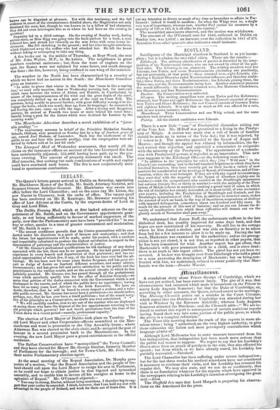SCOTLAND.
Intelligence of the Municipal elections in Scotland is as yet incom- plete; but it includes the two chief cities. These are the results— Edinburgh. The ordinary classification of parties is disturbed by the inter- position of the Nonintrusion faction, who are not owned by either of the poli- tical sides. The following is one statement. The retiring members were five Liberals, two Tories, and seven Nonintrusionists (including one practically, but not professedly, of that party): those returned were, eight Liberals, (in- cluding a Radical Dissenter under Nonintrusion influence, and therefore doubt- ful,) three Tories, and three Nonintrusionists ; the Liberals gaining three, the Tories one, and the Nonintrusionists losing four. Another statement presents the result differently : the members returned were, five Moderate Churchmen, five Dissenters, and four Nonintrusionists.
Dunbar. Six Conservatives were reelected.
GLagow. The retiring councillors were seven Tories and five Reformers; returned, four Tories and eight Reformers; the old Council consisted of seven- teen Tories and fifteen Reformers; the new Council consists of fourteen Tories and eighteen Liberals. It is said that as much as 101. was offered for a vote, and, in one known instance, taken.
Musselburgh. Three Conservatives and one Whig retired, and the SAM numbers were returned.
Paisley. All the elected candidates were Liberals.
There is a new little " case" of Presbyterial dissension arising out of the Veto Act. Mr. M'Duff was presented to a living in the Presby- tery of Meigle. A motion was made that a roll of heads of families should be made up in terms of the Veto Act ; but it was rejected, by II voices to 2. The minority appealed to the Synod of Angus and Mearns ; and though the appeal was vitiated by informalities, the Sy- nod waived that objection, and appointed a commission to cooperate with the minority of the Presbytery. The appointment of a commis- sion with Presbyterial powers is regarded as an innovation. This new case suggests to the Edinburgh Observer the following remarks- " In addition to the principles for which the' [the " Wild men" in the Church] are contending,' and to the half-hundred litigations in which they have involved themselves, they have recently got on their hands a variety of new puzzlers for consideration at the meetings of Synod, of Commission, and of Con- vocation, within the next fortnight. If they act with any regard toconsistency, they must deal with the majority of the Synod of Aberdeen (eighty-one in number)—with the sympathizers who assisted at the Strathbogie sacraments last autumn (twenty-five or thirty in number)—with the majority of the Pres- bytery of Meigle (eleven in number)—making a grand total of cases, in which the rod of discipline has already descended, or is about to fall, of ONE HUNDRED AND FORTY, including the Presbyteries of Strathbogie and Gariocb, and the Strathbogie sympathizers of 1841. This, in addition to detached cases, makes the amount of work on hand, in the way of depositioncsuspensions, or dealings with imputed delinquents, somewhere about one hundred and fifty cases. So much for the amount of this sort of business : and no one can foresee the di- versity of ramifications into which these affficultiea will branch out ere the gloomy month of November shall pass away."
We understand that James Duff, the unfortunate sufferer in the late diabolical deed, has steadily improved for some days back, and that hopes are now entertained of his recovery. He still lies in the cottage where he first found a shelter, and was able on Saturday to be taken from bed for a few minutes to allow it to be made up. During the last week, Mackenzie was examined by the authorities; and as the precog- nition is not yet closed, it is not true, as reported in other papers, that he has been committed for trial. Another report has got afloat, that Mackenzie's wife gave premature birth to a child, and is since dead : there is no truth in this report either. The pistol has not yet been re- covered. A broker was brought over from Edinburgh who sold a pistol to a man answering the description of Mackenzie; but on being con- fronted with him, we understand, refused to swear positively that Mac- kenzie was the man.—Dundee Warder.


























 Previous page
Previous page